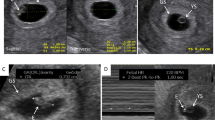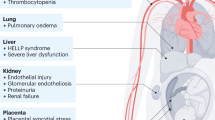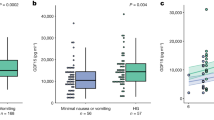Abstract
Objective:
Fetuses exposed to anti-SSA (Sjögren’s) antibodies are at risk of developing irreversible complete atrioventricular block (CAVB), resulting in death or permanent cardiac pacing. Anti-inflammatory treatment during the transition period from normal heart rhythm (fetal heart rhythm (FHR)) to CAVB (emergent CAVB) can restore sinus rhythm, but detection of emergent CAVB is challenging, because it can develop in ⩽24 h. We tested the feasibility of a new technique that relies on home FHR monitoring by the mother, to surveil for emergent CAVB.
Study Design:
We recruited anti-SSA-positive mothers at 16 to 18 weeks gestation (baseline) from 8 centers and instructed them to monitor FHR two times a day until 26 weeks, using a Doppler device at home. FHR was also surveilled by weekly or every other week fetal echo. If FHR was irregular, the mother underwent additional fetal echo. We compared maternal stress/anxiety before and after monitoring. Postnatally, infants underwent a 12-lead electrocardiogram.
Results:
Among 133 recruited, 125 (94%) enrolled. Among those enrolled, 96% completed the study. Reasons for withdrawal (n=5) were as follows: termination of pregnancy, monitoring too time consuming or moved away. During home monitoring, 9 (7.5%) mothers detected irregular FHR diagnosed by fetal echo as normal (false positive, n=2) or benign atrial arrhythmia (n=7). No CAVB was undetected or developed after monitoring. Questionnaire analysis indicated mothers felt comforted by the experience and would monitor again in future pregnancies.
Conclusion:
These data suggest ambulatory FHR surveillance of anti-SSA-positive pregnancies is feasible, has a low false positive rate and is empowering to mothers.
This is a preview of subscription content, access via your institution
Access options
Subscribe to this journal
Receive 12 print issues and online access
$259.00 per year
only $21.58 per issue
Buy this article
- Purchase on Springer Link
- Instant access to full article PDF
Prices may be subject to local taxes which are calculated during checkout



Similar content being viewed by others
References
Hornberger LK, Al Rajaa N . Spectrum of cardiac involvement in neonatal lupus. Scand J Immunol 2010; 72 (3): 189–197.
Buyon JP, Hiebert R, Copel J, Craft J, Friedman D, Katholi M et al. Autoimmune-associated congenital heart block: demographics, mortality, morbidity and recurrence rates obtained from a national neonatal lupus registry. J Am Coll Cardiol 1998; 31 (7): 1658–1666.
Brito-Zerón P, Izmirly PM, Ramos-Casals M, Buyon JP, Khamashta MA . The clinical spectrum of autoimmune heart block. Nat Rev Rheumatol 2015; 11 (5): 301–312.
Brucato A, Doria A, Frassi M, Castellino G, Franceschini F, Faden D et al. Pregnancy outcome in 100 women with autoimmune diseases and anti Ro/SSA antibodies: a prospective controlled study. Lupus 2002; 1: 716–721.
Levesque K, Morel N, Maltret A, Baron G, Masseau A, Orquevaux P et al. Description of 214 cases of autoimmune congenital heart block: results of the French neonatal lupus syndrome. Autoimmun Rev 201514(12): 1154–1160.
Cimaz R, Spence DL, Hornberger L, Silverman ED . Incidence and spectrum of neonatal lupus erythematosus: a prospective study of infants born to mothers with anti-Ro autoantibodies. J Pediatr 2003; 142: 678–683.
Jaeggi ET, Hamilton RM, Silverman ED, Zamora SA, Hornberger LK . Outcome of children with fetal, neonatal or childhood diagnosis of isolated congenital AV block: a single institution’s experience of 30 years. J Am Coll Cardiol 2002; 39 (1): 130–137.
David AL, Ataullah I, Yates R, Sullivan I, Charles P, Williams D . Congenital fetal heart block: a potential therapeutic role for intravenous immunoglobulin. Obstet Gynecol 2010; 116 (Suppl 2): 543–547.
Saleeb S, Copel J, Friedman D, Buyon JP . Comparison of treatment with fluorinated glucocorticoids to the natural history of autoantibody-associated congenital heart block: retrospective review of the research registry for neonatal lupus. Arthritis Rheum 1999; 42 (11): 2335–2345.
Askanase AD, Friedman DM, Copel J . Spectrum and progression of conduction abnormalities in infants born to mothers with anti-SSA/Ro/SSB-La antibodies. Lupus 2002; 11 (3): 145–151.
Raboisson MJ, Fouron JC, Sonesson SE, Nyman M, Proulx F, Gamache S . Fetal Doppler echocardiographic diagnosis and successful steroid therapy of Luciani-Wenckebach phenomenon and endocardial fibroelastosis related to maternal anti-Ro and anti-La antibodies. Am Soc Echocardiogr 2005; 18 (4): 375–380.
Cuneo BF, Ambrose SE, Tworetsky WT . Detection and successful treatment of emergent anti-SSA-mediated fetal atrioventricular block. Am J Obstet Gynecol 2016; 215 (4): 527–528.
Friedman DM, Kim MY, Copel JA, Davis C, Phoon CK, Glickstein JS et al. PRIDE Investigators. utility of cardiac monitoring in fetuses at risk for congenital heart block: the PR Interval and Dexamethasone Evaluation (PRIDE) prospective study. Circulation 2008 29; 117 (4): 485–493.
Krishnan A, Arya B, Moak JP, Donofrio MT . Outcomes of fetal echocardiographic surveillance in anti-SSA exposed fetuses at a large fetal cardiology center. Prenat Diagn 2014; 34 (12): 1207–1212.
Jaeggi ET, Silverman ED, Laskin C, Kingdom J, Golding F, Weber R . Prolongation of the atrioventricular conduction in fetuses exposed to maternal anti-Ro/SSA and anti-La/SSB antibodies did not predict progressive heart block. A prospective observational study on the effects of maternal antibodies on 165 fetuses. J Am Coll Cardiol 2011 29; 57 (13): 1487–1492.
Beck AT, Steer RA, Cargin MG . Psychometric properties of the Beck Depression Inventory: twenty-five years of evaluation. Clin Psychol 1988; 8 (1): 77–100.
Spielberger CD, Gorsuch RL, Lushene R, Vagg PR, Jacobs GA . Manual for the State-Trait Anxiety Inventory. Consulting Psychologists Press: Palo Alto, CA, 1983.
Carver CS . You want to measure coping but your protocol’s too long: consider the Brief COPE. Int J Behav Med 1997; 4: 92–100.
Izmirly PM, Costedoat-Chalumeau N, Pisoni CN, Khamashta MA, Kim MY, Saxena A et al. Maternal use of hydroxychloroquine is associated with a reduced risk of recurrent anti-SSA/Ro-antibody-associated cardiac manifestations of neonatal lupus. Circulation 2012; 26 (1): 76–82.
Izmirly PM, Saxena A, Kim MY, Wang D, Sahl SK, Llanos C et al. Maternal and fetal factors associated with mortality and morbidity. Circulation 2011; 124 (18): 1927–1935.
Llanos C, Izmirly PM, Katholi M, Clancy RM, Friedman DM, Kim MY et al. Recurrence rates of cardiac manifestations associated with neonatal lupus and maternal/fetal risk factors. Arthritis Rheum 2009; 60 (10): 3091–3097.
Jaeggi E, Laskin C, Hamilton R, Kingdom J, Silverman E . The importance of the level of maternal anti-Ro/SSA antibodies as a prognostic marker of the development of cardiac neonatal lupus erythematosus a prospective study of 186 antibody-exposed fetuses and infants. J Am Coll Cardiol 2010; 55 (24): 2778–2784.
Acknowledgements
We thank Ms Megan Brocato and Ms Halley Isberg (Children’s Hospital Colorado Research Institute, Aurora, CO) and Dr Jeannie Zuk (Department of Surgery, University of Colorado, Denver, CO) for data collection. Fetal heart rate monitors were provided by a generous gift in memory of Miss Rachel Cole, from her family.
Author information
Authors and Affiliations
Corresponding author
Ethics declarations
Competing interests
The authors declare no conflict of interest.
Rights and permissions
About this article
Cite this article
Cuneo, B., Moon-Grady, A., Sonesson, SE. et al. Heart sounds at home: feasibility of an ambulatory fetal heart rhythm surveillance program for anti-SSA-positive pregnancies. J Perinatol 37, 226–230 (2017). https://doi.org/10.1038/jp.2016.220
Received:
Revised:
Accepted:
Published:
Issue Date:
DOI: https://doi.org/10.1038/jp.2016.220
This article is cited by
-
Management of Fetal Arrhythmias
Current Treatment Options in Pediatrics (2021)



